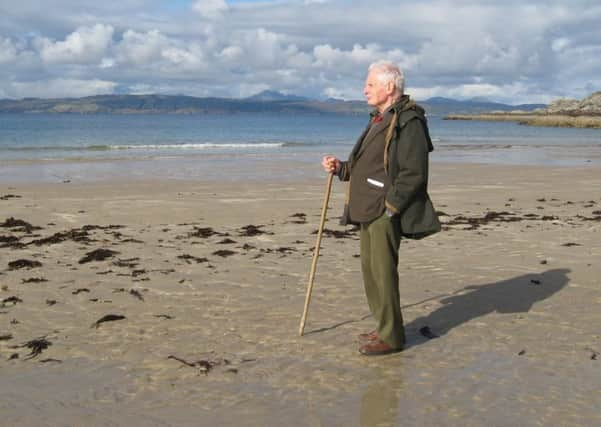Appreciation: Murray Leishman, Kirk minister


Robert Murray Leishman, who has died aged 83, was a former minister of the Church of Scotland who went on to become a leading analytical psychotherapist in Edinburgh, a profession he pursued for more than 40 years, his final paper being published when he was 82. To meet Murray was to engage with a remarkably open-faced charmer who had an infectious delight in the joy of living. The smile would be as warm and homely as freshly buttered toast, the glint in the eye as mischievous as a small boy who had been caught scrumping apples. This was a man it was huge fun to be with, but there was also a sense of profundity ther. He would listen intently to everything anyone said to him and usually think hard before he replied, and this combination of being a warm, accessible individual who nonetheless tolerated no nonsense in intellectual matters made him an ideal therapist.
Murray Leishman was born in Edinburgh, the son of a leading sports journalist, Bobby Leishman, and was initially educated at George Watson’s. His first degree was in English at Edinburgh University, where he became a keen member of the Student Christian Movement, which was then seen as being almost radical in its outlook and encouraged him to seek innovative ways to express his faith.
Advertisement
Hide AdAdvertisement
Hide AdHe was also greatly influenced by attending services at the Greenbank Quest movement, which again was innovative in its Christian doctrine. This led him to St Andrews to study divinity but there was already a certain restlessness in him regarding the nature of the Kirk and its core processes and he found his subsequent charges as a parish minister in tough areas in Greenock, Perth and Glasgow to be both challenging and frustrating.
With such convictions and frustrations it was probably inevitable that he would be drawn to the Iona Community, which he joined around 1956. This community is an ecumenical organisation, notionally based on the island of Iona, which attempts to find radical new ways to both live and present the gospel message. Partly inspired by their aggressive optimism, he decided to launch out in a new direction, becoming the chaplain to the Royal Edinburgh Hospital, which specialises in helping those under mental pressure. His contribution at the hospital was both unique and well received.
The 1970s was a time when the majority of the patients would have had some kind of formative religious experience in their upbringing, yet amongst the therapists religious beliefs were becoming unfashionable.
Murray was often able to be a bridge between these two positions, using his training in spiritual healing to help those raised within religious disciplines while also greatly respecting the validity of the scientific methods, and he started to train to be a therapist, a trade he was to follow for 40 years.
He also started to develop an interest in the work of Jock Sutherland, who was developing innovative ideas concerning how certain institutions, such as the church or hospitals, might be developing stresses amongst those who worked within them, the core objective being to heal the institutions as well as their staffs. With his considerable knowledge of both how the church and hospitals worked, Murray quickly became an acknowledged expert in this field and was soon regarded as being a effective leader of group therapy sessions in a number of institutions as well as working one-to-one with a number of patients.
In 1987 he founded the Harry Guntrip Trust, a small, discreet organisation that offered support to parish ministers and others from religion-based professions who were suffering stress and, as the secretary to the trust and a former minister, he was able to gauge the financial needs of the ministers and fine tune their choice of therapists.
His home life was a joy. While at St Andrews University he had met with the feisty Marista Reith, the daughter and apple of the eye of the formidable Lord, John Reith, the father of the BBC. A delightful broth of a girl, Marista was similarly gifted to Murray in her infectious appetite for life and incisive intelligence, and she was quick to realise that Murray was the man for her.
Lord Reith, however, was less convinced and his bizarre attempts at splitting the couple through humiliating Murray were met by the pair with gales of laughter. Murray particularly relished the memory of the happy pair engineering a meeting with Reith, who had refused to meet him at all, and offering his future father-in-law his hand in friendship as the great man stepped from his chauffeur-driven car.
Advertisement
Hide AdAdvertisement
Hide AdReith refused to even acknowledge his daughter and her fiancée, and it was only the intervention of the incensed chauffeur that forced him to shake the outstretched hand. Murray would also tell of how on another occasion Reith arranged to meet him for tea in an imposing London venue and ostentatiously offered him a cigarette from Reith’s own cigarette case, and then a light from Reith’s own lighter.
Once Murray had accepted and started to smoke Reith paused, glowered triumphantly at Murray and announced. “Of course, I myself don’t smoke.”
Eventually the war between the pair lessened and Reith was to gift them a holiday home in the west coast, though not before Reith (to Murray’s amusement) had avowed that he hated Murray even more than he hated both Churchill and Mountbatten! The couple went on to have a magnificently happy life and had four children, Mark, Iona Martha and Kirsty and five grandchildren; Calum, Ewan, Jennifer, Bryony and Seumas.